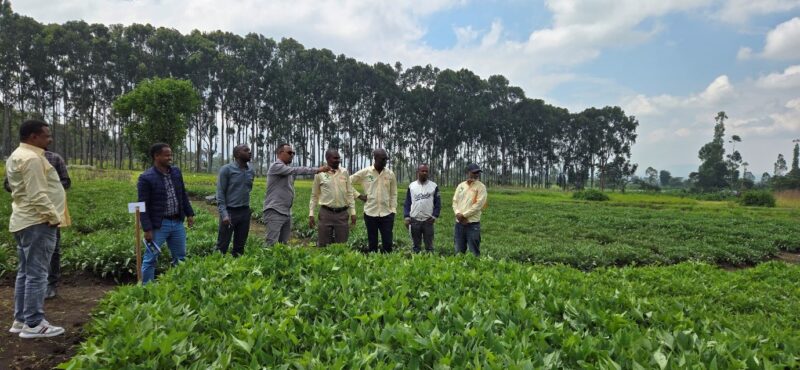
Partnerships for Food Security and Economic Resilience
Ethiopia has been classified by World Food Programme (WFP) as one of the food severe countries in 2024. Several factors including the recent Tigray conflict, drought and natural disasters exacerbate food insecurity. The International Potato Center (CIP) in collaboration with Ethiopian Institute of Agricultural Research (EIAR) under the TAAT II Orange Flesh Sweet Potato (OFSP) Compact Project, is working to enhance food security and economic resilience.
The partnership is focused on producing Early Generation Seed (EGS) of OFSP varieties, providing high-quality planting materials to Decentralized Vine Multipliers (DVMs) and creating demand and awareness about the technology among farmers. Together, CIP and EIAR are building a stronger foundation for sustainable OFSP production and consumption to meet both nutritional and economic needs of the communities in the project targeted areas.
“OFSP Village”: A Community Transformed
Just 15 kilometers from WGRC, a village near Shashamane town is being transformed, earning the nickname “OFSP Village.” Here, OFSP has become highly valued, selling for ETB 60 per kilogram (Higher value compared to maize). Mr. Tashome, a farmer who is a recent beneficiary of WGRC’s interventions, harvested a successful first OFSP crop and has expanded the cultivation on a larger field.
Local women leader, Ramate Desta, has seen firsthand how the community’s interest has grown in just one season after the crop was introduced to her village. Initially, she struggled to recruit members of a women group, but following a successful harvest, her group expanded from 10 to 30 members, all eager to plant.
“Once they saw the harvest, everyone wanted vines! I told them about WondoGenet, which we affectionately call ‘Shito,’” says Ramate.
Nearby, a women farmer, Shahitu, has established herself as a local vine multiplier and supplier, positioning her farm along the main road to attract buyers seeking high-quality OFSP planting materials, known locally as Sukar Dinich
WGRC: Joining the OFSP Charge
Central to this project is the WondoGenet Agricultural Research Centre (WGRC), which is operating under EIAR as one of the research centers. WGRC has dedicated a full hectare of land to the multiplication of clean planting material for four OFSP varieties – Kabode, Alamura, Shafeta, and Dilla. Each variety brings distinct benefits:
- Shafeta: Early maturing with uniform root size, excellent root shape, and strong resistance to weevils, making it ideal for export and for urban markets. It is particularly suitable for moisture stressed areas such as Tigray region due to its early maturity (ready for harvest in 95 days).
- Kabode: Drought-tolerant, has moderate resistance to common sweet potato pests and diseases, and produces good yields even under suboptimal conditions.
- Alamura: Adaptability to diverse growing conditions and produces high yield.
- Dilla: Performs well under various environmental conditions, making it suitable for diverse regions.
Following the signing of the agreement, the research center has distributed over 500,000 vine cuttings to farmers, research institutes, and NGOs. From the sales of these cuttings to individual and institutional buyers, the center, has already generated ETB 250,000, which the center intends to reinvest to sustain early generation seed (vine) multiplication and expand its reach to other regions.

Bridging Knowledge and Empowerment
WGRC’s efforts go beyond vine production; up to date, the center has trained 70 farmers (42 men and 28 women) in good agronomic and post-harvest handling practices of OFSP. Food demonstrations have also highlighted the versatility of OFSP, showing how it can be prepared, enriching grain-based products such as porridge, injera, and bread. OFSP is quickly becoming a staple in households, winning over children and adults alike with its taste and nutritional value.
WGRC remains committed to ensure progress.
A Bright Future for OFSP in Ethiopia
The success of WGRC positions it to play a key role in supplying new projects and expanding OFSP across regions. With a robust business strategy, WGRC could further scale its vine multiplication, creating a self-sustaining model that drives both food security and economic growth.
The CIP-EIAR partnership exemplifies the profound impact that collaborative agricultural research, farmer training, and community engagement can have. The story of WGRC and the “OFSP Village” near Shashamane is just the beginning of an OFSP-powered future for Ethiopia.
